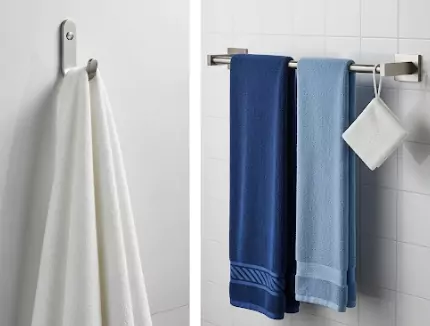
When designing or renovating your bathroom, small details can often be overlooked, yet they play a significant role in both functionality and style. Among these details, choosing between a towel hook and a towel bar is one such decision that impacts your daily routine and bathroom aesthetics.
At first glance, towel hooks and towel bars may seem like similar bathroom accessories — both serve to hang towels and robes. But are they truly interchangeable? In reality, each has unique characteristics that affect space usage, drying ability, convenience, and hygiene.
Towel hooks are simple wall-mounted hooks, usually available in single, double, or triple designs. They are often used not only to hang towels but also bathrobes and garments. Towel hooks are versatile, space-saving, and can fit into small bathrooms or behind doors. Robe hooks for bathrooms are a popular subset, designed specifically to hold bathrobes securely.
Learn More: Why Choose Robe Hooks In Bathroom
Towel bars are horizontal rods fixed to the bathroom wall. They come in single or double bar designs, allowing for multiple towels to be hung simultaneously. Towel bars for bathrooms provide a neat and organized way to display towels fully extended, which improves drying efficiency. They require more wall space but offer a classic look and better towel accessibility.
| Key Difference | Towel Hook | Towel Bar |
|---|---|---|
| Aesthetic Appearance | Minimalist and less cluttered look, ideal for modern or small bathrooms | Polished and organized appearance, makes bathroom look tidy and functional |
| Hanging Method | Towels hang bunched or folded on a single point; also suitable for robes (robe hooks) | Towels draped flat over the rod, allowing them to spread out |
| Space Efficiency | Takes minimal wall space, can fit behind doors or narrow walls | Requires more horizontal wall space but can hold multiple towels without crowding |
| Convenience | Quick and easy to hang towels without folding | Keeps towels organized and easy to access |
| Drying Ability | Towels tend to stay bunched and dry slower due to less air exposure | Towels dry faster because they are spread out flat |
| Cost | Generally cheaper and easier to install | Usually more expensive, depending on material and design |
| Installation | Simple installation with one screw or adhesive | Requires precise measuring and secure fixing, especially for double bars |
| Hygiene | Moisture can get trapped, increasing mildew risk if towels aren’t washed regularly | Towels dry faster, reducing mold and bacteria growth |
| Maintenance | Easy to wipe down due to simple design | May need occasional cleaning for water spots or residue, especially metal finishes |
Towel bars and hooks create different visual impressions. Towel bars often give a polished, organized look, making your bathroom appear functional and tidy. In contrast, towel hooks lend a minimalist vibe, ideal for modern or compact bathrooms where less visual clutter is desired.
With a towel bar, towels are draped over the rod, spread out flat. Hooks, however, allow towels to hang bunched up or folded over a single point. Robe hooks provide a simple spot to hang robes without needing to fold.
If bathroom space is limited, bathroom hooks instead of a towel bar can be a smart choice. Hooks take up minimal wall area and can be placed behind doors or on narrow walls. Towel bars require more horizontal space but can hold multiple towels without crowding.
Towel hooks offer quick hanging without the need to fold towels neatly, making them convenient for busy households. On the other hand, towel bars or hooks both provide easy access, but towel bars keep towels more organized.
One of the most critical differences is drying efficiency. Towel bars allow towels to dry faster because they are spread out flat, exposing more surface area to air. Towels hung on hooks tend to stay bunched and moist longer, which can slow drying.
Towel hooks tend to be more cost-effective and easier to install, making them a budget-friendly option. Towel bars, depending on the material and finish, can be pricier and usually require more secure wall mounting.
Hooks are generally easier to install, often requiring just a single screw or adhesive mount. Towel bars, especially double bars, need precise measuring and secure fixing to support the weight of wet towels.
Because towels dry more quickly on bars, they tend to stay fresher and less prone to mold or bacteria growth. Hooks can trap moisture in folds, increasing the risk of mildew if towels are not washed regularly.
Towel bars may require occasional cleaning to remove water spots or soap residue, especially if they are made of metal finishes. Hooks are usually easier to wipe down due to their simple design but should be checked to ensure towels aren’t causing buildup or odors.
When deciding between towel bars and hooks, consider your bathroom size, style preferences, and daily habits. At Faao, we offer a curated selection of towel bars and hooks that combine quality, durability, and modern design. Whether you prefer the streamlined look of towel bars for bathroom walls or the space-saving convenience of robe hooks, Faao has the perfect solution for your needs.
Choosing between a towel hook and a towel bar is more than just a design choice — it influences your bathroom’s functionality, hygiene, and overall feel. Understanding the nine key differences outlined here will help you make an informed decision that suits your lifestyle and space. Remember, whether it’s towel bar or hooks, selecting the right bathroom accessories will enhance your daily routine and keep your space organized.